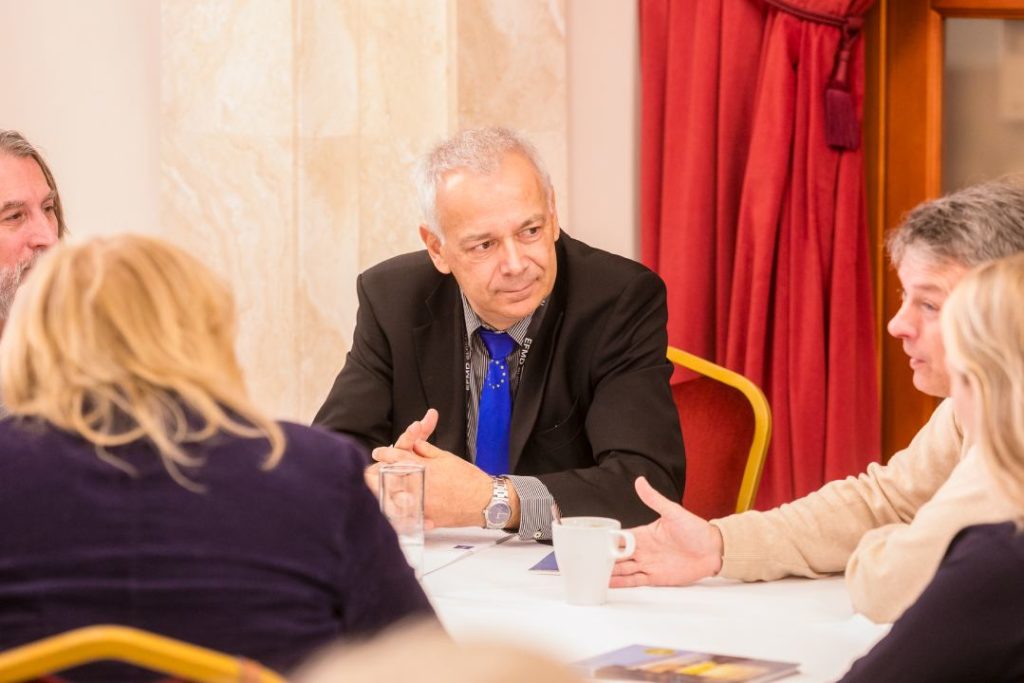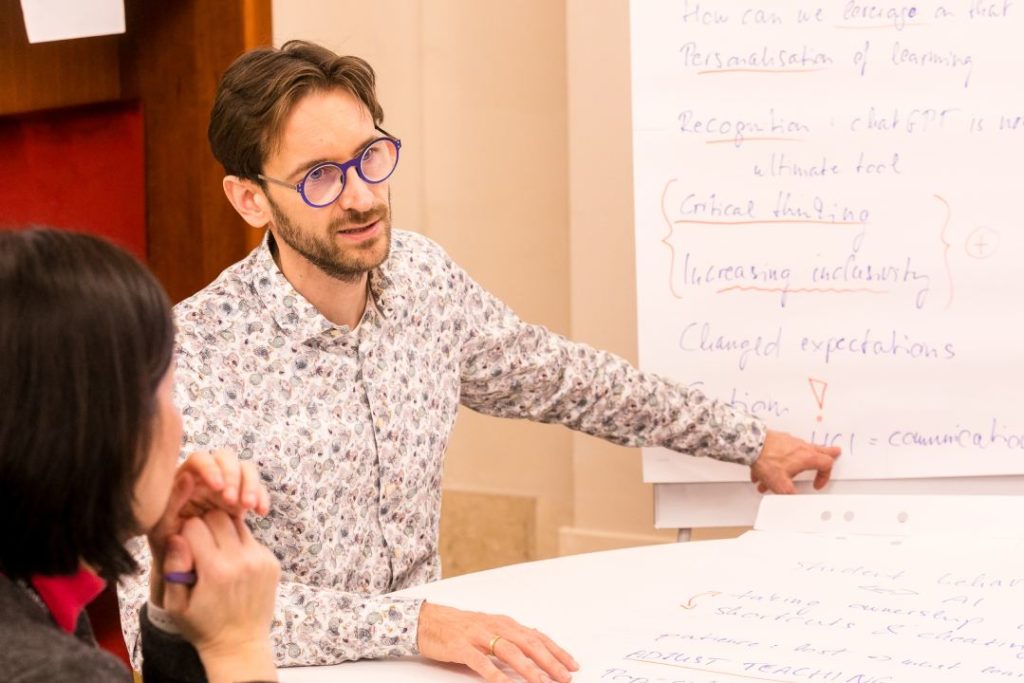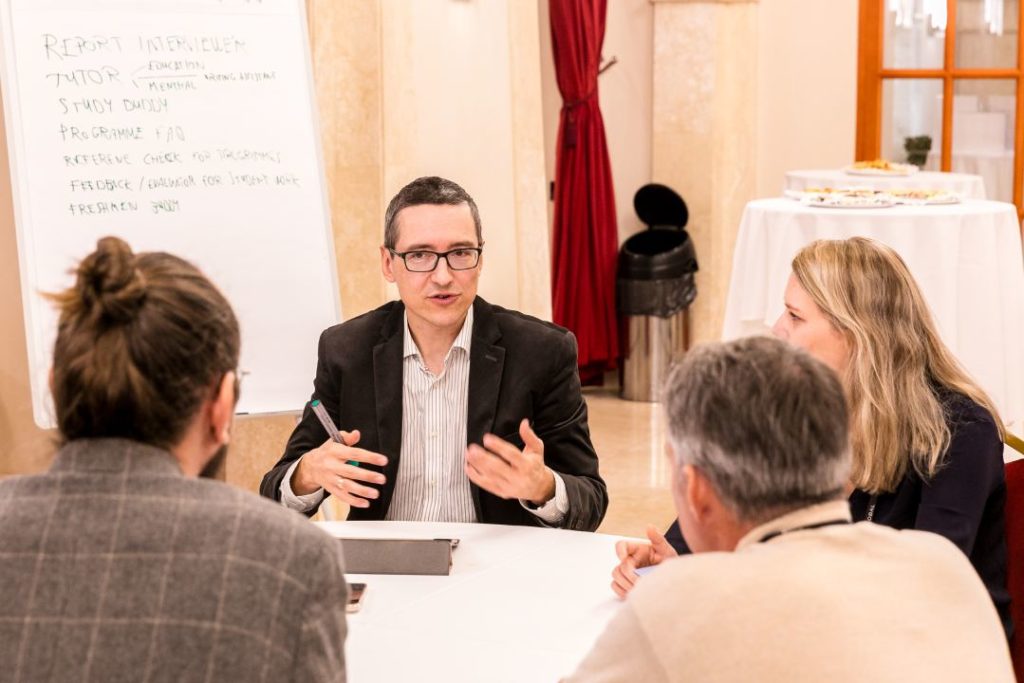The work of the future will be different, not less, the key is adaptability
_20231206125140_0.jpg)
“Undergraduate programmes are a stepping stone to a professional career,” says the opening page of the conference website. The annual conference for directors and administrators of Bachelor programmes in management and related areas put the focus on artificial intelligence.
On the last day of the conference, Dr. Richárd Szántó, Dean of Undergraduate Programs and the Chair of the conference welcomed the participants. The first session of the closing day was a round table discussion led by Dr. Péter Fehér, Vice-President for International Relations. Representatives of leading Hungarian companies as well as Judit Nagy, Program director of BSc in Business and Management and Regina Bunevácz, Master’s student, t discussed the impact of technology on student’s career and how they should prepare for these challenges.
Work will be different, not less
The impact of artificial intelligence is already being felt in workplaces, and this trend is predicted to continue, according to the participants of the discussion. However, it was also pointed out that the number of tasks will not be reduced but it will change the form of those tasks.
“The nature of work is changing, it is an obvious trend. This, however, does not mean that there will be fewer tasks but that there will be different ones,” said Tamás Bárány, Head of Group Recruitment at MOL Group. He said that labour shortages will continue to be a serious problem in the future, and higher education, including the cooperation with Corvinus University, will play an important role in solving this problem.
Artificial intelligence is not a new phenomenon, it has been present in our lives for several years, as Balázs Fertig, Recruiting and Onboarding Lead Director of MBH Bank, put it. He has tried ChatGPT himself and in 80% of the cases he received good results. What you need to focus on is the remaining 20%. This not only applies to areas where it is not enough to make generally formulated statements but also includes specific management decisions that cannot be left to artificial intelligence.
Regina Bunevácz, who participated in the discussion as a master’s student of Corvinus Management and Leadership with CEMS, sees AI as a kind of personal assistant. “AI is just a tool to make a presentation or learn something new about a topic,” she said about where she already uses it in her studies and work.
AI-based softwares are doing 80 per cent of the job well, so universities need to concentrate on the remaining 20 per cent, according to Judit Nagy, associate professor at Corvinus and Program Director of Bsc Business and Management . She believes that in the future the primary focus will be on creativity, critical thinking, comprehensive understanding and a balanced use of the opportunities available.
Constantly adapting to challenges
To successfully meet the challenges of an accelerated and increasingly unpredictable future, students need to develop adaptability.
“All the major companies are building their own AI-based solutions, and they can be very different,” said Balázs Fertig, referring to the fact that it is impossible to learn how to use every software in a single university course. In his view, critical thinking is required to help career starters adapt to the solutions used by their employer.
The diverse attitude of companies towards AI was also confirmed by Tamás Bárány. At MOL, e.g., health and safety is a top priority, so they rather focus on proven solutions. This, however, does not mean that there is no room for new initiatives in this sector or that new management programmes might not be necessary.
He also pointed out that there can be significant differences between industries and company size. In an IT or other digital technology-driven sector, artificial intelligence will obviously play a bigger role, but the difference could be significant between large companies and small and medium-sized enterprises too.
Juniors could be the new inspiration and the future of the company
“Managers need to know these solutions and understand these principles,” said Regina Bunevácz adding that it is important to ensure that workers do not lose their skills during the outsourcing process. This is also true for juniors, because even though we can do 80% of the work with AI, to become a real leader you need to have the right skills to be able to do the remaining 20%
The emergence of AI also presents another difficulty for juniors. AI is e good in tasks typically done by junior colleagues., therefore the demand for the work provided by juniors is decreasing, but “if there are no juniors, there will be no senior colleagues later on“, said Tamás Bárány, pointing out the contradiction. “Moreover, we are also looking for new inspiration from them, because we need someone who can come up with original ideas and can draw our attention to new solutions,” he added.
As a result while possesing the specific skills needed there is an increasing expectations from fresh graduates to be willing to learn and the company is more frequently seen as a place for continuous learning.
Artificial intelligence will have to be used in this process. “Let’s show students how it works and how to use it. Let’s allow them to use it and mentor them, while keeping their own ideas ” said Judit Nagy on what universities need to do to ensure that artificial intelligence supports, rather than takes away, the work of career starters coming out of university.
“We need to teach the general principles of how AI works. We need to train students who are flexible and want to learn. Students who accept that change will be continuously present in their lives and who want to adapt to this”.
Author: Máté Kovács (AI-free content)
The Panel discussion was followed by a Word Café session , where participants had the opportunity to work on seven different topics at seven different tables. With the exception of one topic, the moderators of the discussion were lecturers from Corvinus University.
Participants in Friday’s World Café session discussed the impact of generative AI on higher education. Dr. Tamás Bokor’s topic explored how the proliferation of the use of generative artificial intelligence is affecting student behaviour. Dr. Zsolt Balogh’s panel explored the ethical issues of generative AI and their consequences. Dr Csáki Csaba’s group discussed the need for new institutional guidelines to address the challenges of AI appearing in education.
The participants of the panel discussion came from nine different countries thus they were able to present different aspects. Most institutions have not formulated specific policies on generative AI, with initial reactions ranging from panic to surprise. Although five institutions have produced guidelines primarily for educators and only a fraction of them have addressed AI-related examination regulations. . Interesting to note that no institution has banned the use of generative AI altogether. A few universities have set up AI committees to examine related issues, two of which have explicitly involved students in the committees.
Dr. Judit Nagy and her group highlighted the need to rethink assessment methods in the age of generative AI. Dr. Péter Fehér’s group focused on the importance of teacher training. Training requires collaboration between lecturers , teamwork and balance between bottom-up initiatives and top-down support. Róbert Pintér and his group explored the possibility of creating personal ChatGPT tools, while Friedemann Schulze-Fielitz, Director of EFMD Global Business School Services, and his group explored the impact of AI on the future of the labour market.
The conference ended with a closing plenary by Róbert Nagy, Managing Director of IT Technology at MBH Bank, entitled “Back to the Future”.









